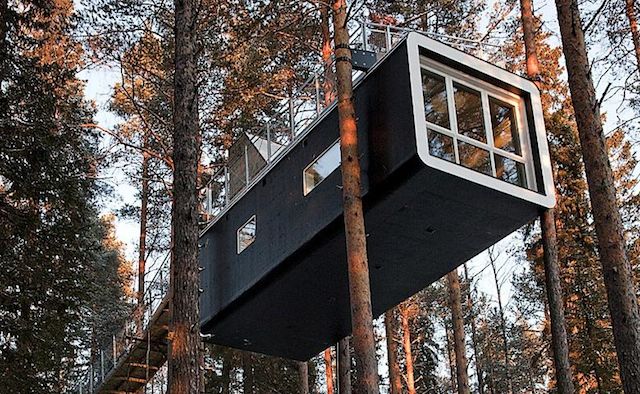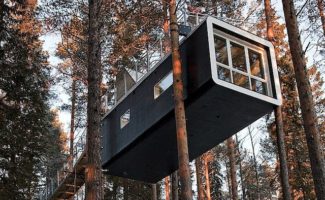
By Daphne Auza
Whether you grew up in the open countryside or an urban apartment, there’s a high chance that at some point in your life, you daydreamed of having your own tree house. The appeal of this fantasy might have resided in its exclusivity, or perhaps the rustic, handmade quality associated with these childhood hideouts. A hotel in Harads, Sweden has taken advantage of these characteristics by offering “treerooms” as high-end accommodations.
The rooms are built approximately four to six meters above the ground with a view of the Lule river valley and at certain times of the year, spectacular glimpses of the Northern Lights. Leading Scandinavian architects were hired to take on the project, which aims for unique, environmentally friendly designs. The hotel plans on building a total of about eight to ten tree houses, but currently seven rooms occupy the pines of the forest area around Harads.
Britta Jonsson-Lindvall and Kent Lindvall founded Treehotel in 2010. Neither of their careers originated in sustainability work, as Britta formerly worked in the healthcare industry and Kent in education. However, their respective passions for provincial development in Harads and adventure tourism led them down a new path. Britta now manages the hotel as vice president, while Kent handles marketing.
The concept of Treehotel was inspired by the 2008 film “The Tree Lover” by Jonas Selberg. The plot revolves around three men who aspire to return to their roots by building a tree house. Treehotel is built on the similar ideal that people can unwind through a return to nature.
Guests can also enjoy the hotel’s tree sauna and restaurant boasting a 1930-1950s theme, but they do not have to remain within the confines of Treehotel for their entire stay. The hotel organizes activities that encourage thorough exploration of the surrounding environment. Dog sled and snowshoe tours are available during the winter and spring, while visits to nearby reindeer pastures can be made year round.
Each of the tree houses has its own defining quirks. The appearance of “The Bird’s Nest”, for one, is true to its name. Branches and thatch camouflage the structure, which guests can only access via a retractable staircase. Another tree house, “The Mirrorcube”, operates on a similar concept but uses mirror walls to make the structure blend in with the surrounding foliage. Others emulate a UFO, a red brick house and even Lego blocks.
The unobtrusive architecture reflects the hotel’s aim to make as minimal of an environmental impact as possible. In fact, accessing the tree houses is a slight challenge in itself since each one is structured to adjust to nature rather than human convenience. Some can only be entered by retractable staircases that expand up to two stories high, others by ramps and bridges.
The hotel also holds the record for having built the largest and heaviest functional tree house in the world. In December 2012, Treehotel debuted “The Dragonfly” room, designed by Finnish architect Sami Rintala. Able to host up to four guests and conference facilities, it is their most spacious accommodation yet.
The rooms of Treehotel utilize a number of sustainable practices. Each room boasts a modern combustion toilet and water efficient sinks. And while they vary in design, every tree house is made from environmentally friendly materials and construction techniques. They also contain eco outdoor wooden floors that lack chemical substances but possess an intrinsic resistance to damage.
In addition, the electricity that propels the daily operations of the establishment is supplied locally by hydroelectric power. Lighting consists of low energy LED systems. These sustainability efforts have not gone unnoticed. For exemplifying the benefits of green architecture, Treehotel has been featured in the second volume of Green Architecture Now! by TASCHEN books.
The hotel highly emphasizes doing everything on “nature’s terms”. Its sustainable features make the tree houses a bit simpler than typical luxury lodging, but there’s no question that it successfully demonstrates many possibilities for low impact, eco-friendly tourism and lodging.
Based in Los Angeles, Daphne Auza is a current student at Occidental College pursuing a major in English and Comparative Literary Studies. Her interests lie in travel, poems, and the intersection between the arts and social justice, but her curiosity extends far beyond those realms as well. She likes to think that many of her passions are founded on her seemingly insatiable restlessness. You can check out her daily musings and other writings at candidkandu.tumblr.com.
Photos via Treehotel
